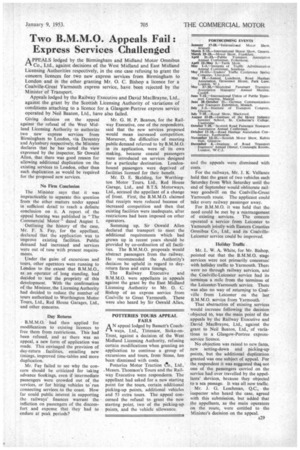Two B.M.M.O. Appeals Fail : Express Services Challenged
Page 31

If you've noticed an error in this article please click here to report it so we can fix it.
A PPEALS lodged by the Birmingham and Midland Motor Omnibus 4-1 Co., Ltd., against decisions of the West Midland and East Midland Licensing Authorities respectively, in the one case refusing to grant the concern licences for two new express services from Birmingham to London and in the other granting Mr. 0. C. Bishop a licence for a Coalville-Great Yarmouth express service,, have been rejected by the Minister of Transport.
Appeals lodged by the Railway Executive and David MacBrayne,Ltd., against the grant by the Scottish Licensing Authority of variations of conditions attaching to a licence for a Glasgow-Portree express service operated by Neil Beaton, Ltd., have also failed.
Giving decision on the appeal against the refusal of the West Midland Licensing Authority to authorize two new express services from Birmingham to London, via Daventry and Aylesbury respectively, the Minister declares that he has noted the view expressed by the inspector, Sir Oswald Allen, that there was good reason for allowing additional duplication on the existing services to London, other than such duplication as would be required for the proposed new services.
No Firm Conclusion The Minister says that it was impracticable to separate this question from the other matters under appeal in sufficient detail to reach a definite conclusion on it. A report of the appeal hearing was published in " The Commercial Motor" dated August 1.
Outlining the history of the case, Mt. F. S. Fay, for the appellant, declared that the application was to improve existing facilities. Public demand had increased and services were out of tune with present requirements.
Under the guise of excursions and tours, other operators were running to London to the extent that B.M.M.O., as an operator of long standing, had decided to test the propriety of this development. With the confirmation of the Minister, the Licensing Authority had decided to reduce the number of tours authorized to Worthington Motor Tours, Ltd., Red House Garages, Ltd., and other concerns.
,Day Returns
B.M.M.O. had then applied for modifications to existing licences to free them from restrictions. This had been refused, and as there was no appeal, a new form of application was made. This envisaged the provision of day-return facilities, entailing new timings, improved time-tables and more duplication.
Mr. Fay failed to see why the concern should be criticized for taking advance bookings, even if intermediate passengers were crowded out of the services, or for hiring vehicles to run connecting services to the coast. How far could public interest in supporting therailways' finances warrant the infliction on passengers of the discomfort and expense that they had to endure at peak periods? Mr. G. H. P. Beame-s, for the Railway Executive, one of the respondents, said that the new services proposed would mean increased competition. Moreover, the difficulties of meeting public demand referred to by B.M.M.O. in its application, were of its own making, because coastal passengers were introduced on services designed for a particular destination. Londonbound passengers were deprived of facilities licensed for their benefit.
Mr. D. E. Skelding, for Worthington Motor Tours, Ltd., Red House Garage, Ltd., and B.T.S. Motorways, Ltd., accused the appellant of a change of front. First, the B.M.M.O. claimed that receipts were reduced because of increased competition and then that existing facilities were inadequate, after restrictions had been imposed on other operators.
Summing up, Sir Oswald Allen declared that transport to meet the additional requirements which had grown up in recent years should be provided by co-ordination of all facilities. The B.M.M.O. proposals would abstract passengers from the railway. He recommended the Authority's decision be upheld in regard to dayreturn fares and extra timings.
The Railway Executive and B.M.M.O. were appellants in appeals against the grant by the East Midland Licensing Authority to Mr. 0. C. Bishop of an express service from Coalville to Great Yarmouth. These were also heard by Sir Oswald Allen, and the appeals were dismissed with costs.
For the railways, Mr. J. K. Valiance held that the grant of two vehicles each Saturday from Whit Saturday until the end of September would obliterate railway goodwill on the Coalville-Great Yarmouth route. The applicant could take every railway passenger away.
For B.M.M.O. it was held that the need could be met by a rearrangement of existing services. The concern operated a service from Leicester to Yarmouth jointly with Eastern Counties Omnibus Co., Ltd., and its CoalvilleLeicester service could be improved.
Holiday Traffic
Mr. L. W. A. White, for Mr. Bishop,
pointed out that the B.M.M.O. stage services were not primarily concerned with holiday traffic to Yarmouth. There were no through railway services' and the Coalville-Leicester service had its terminus a mile from the terminus of the Leicester-Yarmouth service. There was also no way of returning to Coalvine from Leicester on the last B.M.M.O. service from Yarmouth.
That abstraction of existing services would increase following the decision • objected to, was the main point of the appeals by the Railway Executive and David MacBrayne, Ltd., against the grant to Neil Beaton, Ltd.,. of variations to a Glasgow-Portree expressservice licence.
No objection was raised to new fares, new setting-down and picking-up points, but the additional duplication granted was one subject of appeal. For the respondent it was suggested that not one of the passengers carried on the service had ever travelled by the appel lants' rvices, because they objected to a sea passage. It was all new traffic.
Mr. J. G. Leechman, Q.C., the
inspector who heard the case, agreed with this submission, but added that the appellants, as the main operators on the route, were entitled to the Minister's decision on the appeal.












































































































































































